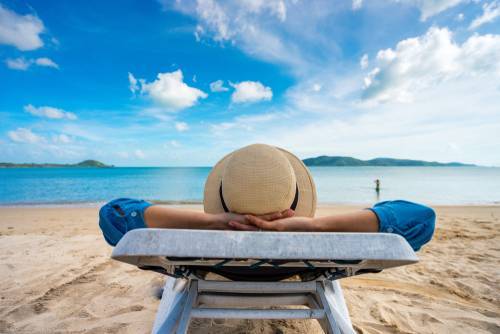In today’s fast-paced lifestyle, the duration of vacations granted to employees varies by country, institution, and applicable laws. However, beyond the legal perspective, the health aspect of taking breaks is highlighted, as every worker, regardless of their organization or country, is entitled to vacations. The human body remains the standard for determining weekly and yearly breaks. What are the signs indicating the need for a vacation?
Generally, the body requires a vacation to detach from work pressures weekly and also to break the routine of life with all its associated stresses and responsibilities from time to time. The importance of vacations lies in renewing energy mentally and physically. Who among us does not find a holiday an opportunity to relieve stress and regain energy? After returning to work and life, we typically do so with more enthusiasm and drive, especially after a long annual vacation. It is a fundamental right for the body and mind, not a luxury as some may consider it.
For some, work conditions might not allow thinking about rest and vacation. However, it is essential to avoid any physical and psychological complications that may arise after prolonged effort close to burnout. Studies show that while the duration of annual vacations may vary, all agree on the necessity of regular breaks, as vacations taken regularly help prevent physical and mental exhaustion that can arise from chronic stress. This makes enjoyment and experiencing vacations a priority in life. According to Forbes, there are specific signs that can indicate the need for a vacation at any time:
- **Quick Irritability**: When it seems you are losing control of your nerves and react quickly due to excessive stress, you may desperately need a vacation. Sometimes, problems seem bigger than they are, while, in reality, they are easier to manage. In such moments, a vacation helps regain control.
- **Making Poor Choices**: Mental and physical pressure causes fatigue, leading to a loss of motivation in life. At such times, we tend to make unsuitable choices concerning our diet, neglect exercise, and even overlook self-care and health. Even behaviors can be significantly affected by spending too much time in front of screens, making vacations seem necessary.
- **Frequent Mistakes**: When facing challenges in concentration, the likelihood of making mistakes increases. If this is noticeable, it is essential to take a vacation as soon as possible to rest for a fresh start at work.
- **Sleep Disorders**: When there is an increase in the need for naps after lunch, fatigue is evident, and you struggle to fall asleep or suffer from insomnia, it indicates that a change is needed. A vacation is the perfect solution to restore energy and feel renewed, helping to regain a healthy sleep schedule.
- **Neglecting Personal Life**: Focusing solely on work responsibilities while neglecting family, personal life, friends, and all outings outside work is a signal to reconsider the balance between work and personal life. A vacation is viewed as the solution.
- **Last Vacation Is Just a Memory**: If you struggle to remember your last vacation and the details of the holiday you spent, it indicates that you are in urgent need of a new break.
- **Not Enjoying the Weekend**: If you don’t find any enjoyment in the weekend and only feel like lying down and resting, it suggests that your energy levels have dropped to their lowest. You need a vacation to renew your vitality.
**What Is the Ideal Length of a Vacation?**
While vacations are a crucial need for individuals at times, questions arise about the ideal duration to meet the body’s energy needs. A study published in 2012 at Tampere University in Finland found that an individual’s health and well-being peak on the eighth day of a vacation. However, researchers did not consider eight days the ideal duration for feeling satisfied and improving mood. Generally, according to the study, the vacation should extend slightly beyond a week. If it exceeds 11 days, anxiety levels may rise due to accumulating work tasks.
At the same time, researchers believe that the benefits of such vacations are short-term, and sometimes, shorter, more frequent vacations can be more beneficial, especially for those who cannot afford long breaks due to work conditions. This helps regain energy and feel renewed.
In any case, although a vacation is regarded as an urgent need for individuals, whether long or short, to take a break from daily life, there is also debate over this subject. Sometimes, vacations themselves can become a source of stress for several reasons:
- **Financial Concerns**: Vacations are often considered costly, and not everyone can afford them. However, the strong desire to take a break often prevails, and some may face financial challenges in order to afford it.
- **Different from Expectations**: Sometimes vacations do not go as expected. When hopes are pinned on a holiday characterized by fun or relaxation, the reality can sometimes be disappointing.
- **Increased Stress from Maximizing Enjoyment**: Stress may sometimes arise from physical exhaustion, but it can also emerge from the desire to maximize enjoyment from the vacation. In such cases, many encounter more physical stress due to lack of sleep, ongoing fatigue, lifestyle changes, and poor dietary habits, negatively affecting their mental state. The situation may worsen afterward, especially when the vacation is short, which increases the desire to gain maximum benefit from it.




